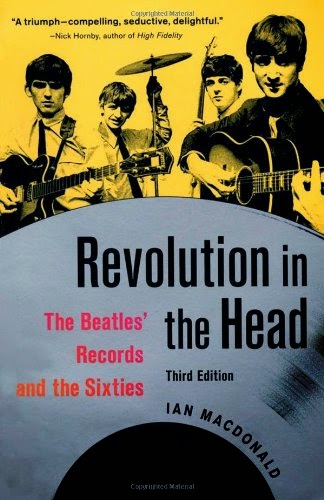In terms of
popular music literature, I would hazard a guess that The Beatles have probably
had more written on them than any other musician, despite the fact that most of
that literature is sub-standard, lacking in quality and even in some cases
factual information. This is definitely not the case with Ian McDonald’s book Revolution in the Head: The Beatles Records
and the Sixties, which to my eyes is the most complete analysis of The
Beatles and their music I have ever read.
Ian McDonald
was a British music critic and author whom sadly passed away in 2003. But he has
left a brilliantly researched and well written sociological and musicological Beatles
bible. “Revolution in the Head” details every song the band recorded together in
chronological order from 1961 to the reunion session sin 1995, describing in
detail the music itself, the context behind it, the lyrics, and for some
individual songs a complete backstory contextualising that song with the
personal life of the writer and the cultural context of the time. Each entry is
also accompanied by a list of the musicians who played on each song and how
they contributed musically to that track, which in itself offers a very good
insight into the way the band operated in the studio and also how multi-skilled
they were at moving between different instruments. McDonald’s analysis and
opinion of each song is very forthright and this book is certainly no Beatles
love-in by any means, thank god, as often Beatles literature is reduced to
nothing but praise for their achievements without considering their lesser
moments both musically and personally. His musicological and sociological
commentary is highly critical and he is not afraid to come out strongly against
the songs themselves, the cultural climate of the 60s and even the band members
and their personal misgivings while in the band. This makes “Revolution in the
Head a refreshingly interesting, informative and un-biased read.
Aside from
the main body of the book which contains the analysis of the music, the book
also begins with an interesting essay titled “Fabled Foursome, Disappearing
Decade”, an essay where McDonald offers an analysis of the major social and
cultural changes of the 60s and the decade’s legacy thereafter in the 1970s and
80s. Here McDonald’s argument is that the Beatles represented a meeting point
of three cultural trends which were crucial to the 1960s period, materialistic
individualism, the radicalism of the new left, and the psychedelic pacifism of
the hippy movement. McDonald then reaches the conclusion that the 60s as a
whole had little in the way of a long-lasting influence on mainstream society,
something which you can kind of see when you look at what followed during the
me-decades of the 70s and 80s.
In conclusion,
McDonald does a good job in placing the Beatles and their music within the
context of the time, giving the songs some cultural and social meaning,
especially their later more experimental work. I am also glad he avoided going
down the line of attempting to interpret hidden meaning behind their lyrics and
investigate potential hidden messages as many have made a life-time obsession
out of, as this would only have served to distract from what is a very detailed
and thoroughly researched analysis. If ever there was a book which highlighted
how this band’s journey was a long and winding road both musically in terms of
style and culturally it is this one. McDonald gives the Beatles story an honest
and rigorous assessment, with no pre-conceived fandom encroaching on the story
and the overall content. A must read for any music fan and also those
interested in musicology and 60s-70s sociology.
A+
- Sam


No comments:
Post a Comment